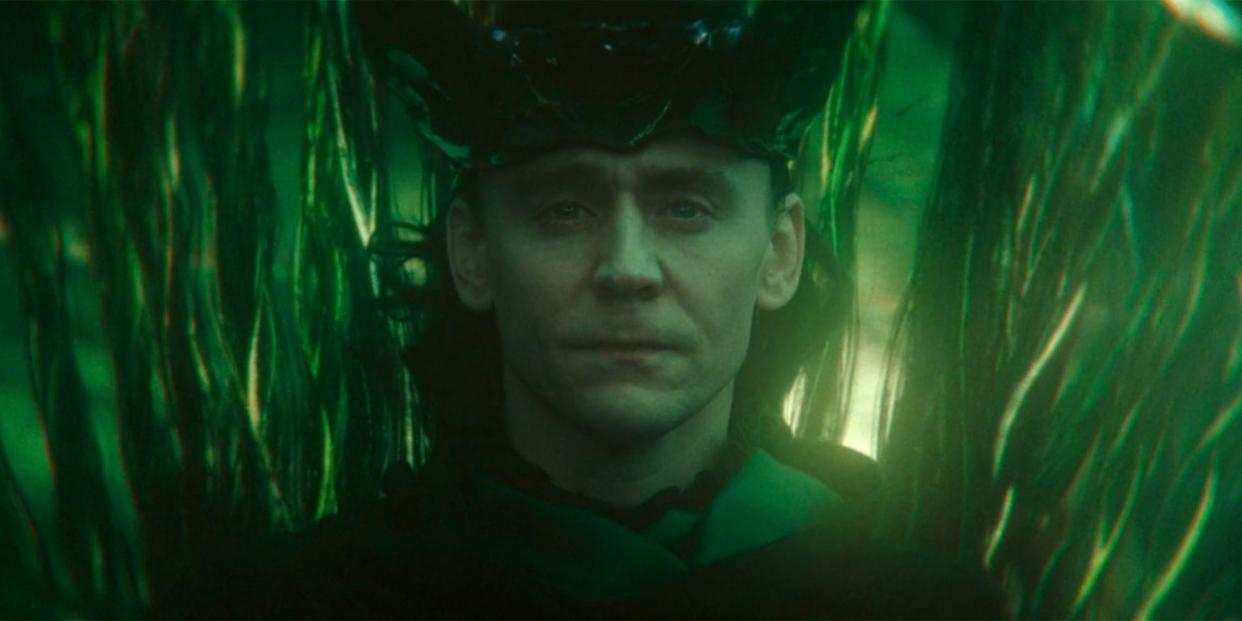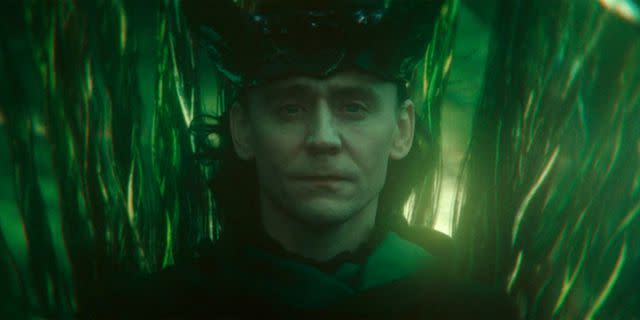Tom Hiddleston breaks down the 'poetic redemption' of the “Loki ”finale

Marvel's god of mischief opens up about that major sacrifice in the season 2 finale — and whether he's really saying goodbye to Loki.
Warning: This story contains major spoilers for the Loki season 2 finale, “Glorious Purpose.”
Has any Marvel character grown quite as much as Loki? Since his debut in 2011’s Thor, Tom Hiddleston’s god of mischief has died and been resurrected too many times to count, evolving from angsty little brother to maniacal villain to reluctant hero in his own right. The Disney+ series Loki has placed him firmly in the spotlight, following him as he’s fought to protect the universe and forged friendships with allies like Sylvie (Sophia Di Martino) and Mobius (Owen Wilson). In the season 2 finale, he makes one final sacrifice, taking responsibility for the multiverse and sentencing himself to a lonely eternity at the end of time.
It's a heroic decision from one of Marvel’s oldest villains, and speaking to EW a few days after the finale, Hiddleston described Loki’s final act as “poetic redemption.” He points out that the finale’s title, “Glorious Purpose,” is the same as the series premiere from way back in season 1. It’s taken from a line in 2012’s Avengers, and Hiddleston says he and the crew essentially used it as a mission statement for the entire series.
“I knew we were trying to chase an answer to that question: What is Loki’s glorious purpose?” Hiddleston explains. “Season 2 is asking: Are we in charge of our own story? Can a leopard change its spots? Can Loki change? Can the TVA change, given a second chance with enough introspection and responsibility? Is there free will? Are we truly in control of our destiny? That seemed to me to be very, very deep water to be working in, and we found it thrilling at every turn. I hope the audience does as well.”

That search for “glorious purpose” extends to pretty much every character on Loki, he adds, pointing to Mobius, Sylvie, and other TVA employees like Hunter B-15 (Wunmi Mosaku) and O.B. (Ke Huy Quan).
“Everyone is in a state of existential crisis or existential doubt — and doubt is an interesting place to learn,” Hiddleston says. “Doubt gives rise to curiosity, and within curiosity is this profound search for meaning. That’s something I think we can all relate to because we all want our lives to mean something. We all want our lives to have purpose, and that’s in the DNA of the show.”
The episode’s title isn’t the only nod to Loki’s evolution, either. As he walks toward the loom and prepares to ascend his new throne, he looks back at his friends, telling them he has to do this “for you, for all of us.” It’s a direct callback to a line Loki says in the original 2011 Thor, when he’s speaking to Anthony Hopkins’ Odin. Executive producer Kevin Wright tells EW that Hiddleston improvised its use in Loki.
“It was 100 percent Tom,” Wright explains. “We had already done a few takes of the first part of that line, which was ‘I know what kind of god I need to be.’ And on the final take, Tom said, ‘Hey, can I try this?’ As soon as he said it, all of us were like, ‘This is going to be the take.’"
Hiddleston says he and the cast and crew had been filming in the “loom room” for days, shooting and reshooting all the different versions of Loki time-slipping. As directors Justin Benson and Aaron Moorhead set up for that final shot, Hiddleston decided to focus by going for a run around Pinewood Studios in the U.K.
“I was actually jogging around the lot,” the actor explains. “It was a sunny day, and I was listening to a piece of music. I think it might have been the music from the first Thor film. I was listening to Patrick Doyle’s score, and I realized it was just a full-circle moment. It just came to me, like, ‘I should say that.’ It’s something Loki says in the first Thor film, and I felt like it had a whole other meaning.”
But Hiddleston refuses to take full credit for the improvisation, praising Wright, Benson, Moorhead, and the rest of the Loki crew for always indulging his ideas. “The set never felt locked or constricted,” he says. “It was a very alive place, alive to invention or imagination. So, Owen Wilson could come up with some absolutely golden line as Mobius, or Sophia Di Martino could have an idea about a particular energy that Sylvie needed in a scene. To have that environment where the best idea wins is just the dream. And it doesn’t happen every time.”
Perhaps it’s no surprise that Hiddleston knows Loki inside and out: He’s been playing the god of mischief for almost 14 years, stretching from early releases like Thor and Avengers to recent hits like Thor: Ragnarok, Infinity War, and Endgame. He’s also died and been resurrected countless times, whether because of a death fake-out or popping up in an alternate timeline. The Loki finale feels like a true goodbye, a promotion from “god of mischief to “god of stories.”
But given Loki’s multiple past deaths and misdirections… is this really the end? Is Hiddleston really saying goodbye to his iconic horned anti-hero?
“It’s hard to say,” Hiddleston admits. “I’ve made the mistake in the past of tying things up with a bow and saying goodbye and thinking it’s all over. And then, the phone rings a year later, going, ‘Hey Tom, what are you doing in a couple of months?’ So, I’m keeping an open heart and an open mind. But it does feel that there is a poetic redemption to where we are, and I felt very honored to perform that.
“I feel very proud of where we’ve landed in the end,” he continues. “Where we are right now is all I know, and it felt really meaningful to come full circle.”
Sign up for Entertainment Weekly's free daily newsletter to get breaking TV news, exclusive first looks, recaps, reviews, interviews with your favorite stars, and more.
Related content:
Watch Tom Hiddleston address Loki's potential ability to bring Tony Stark back from the dead
Loki director Kate Herron reveals how Tom Hiddleston helped shape that finale kiss
Tom Hiddleston suggested that emotional Thor callback in the Loki season 2 finale
Read the original article on Entertainment Weekly.
